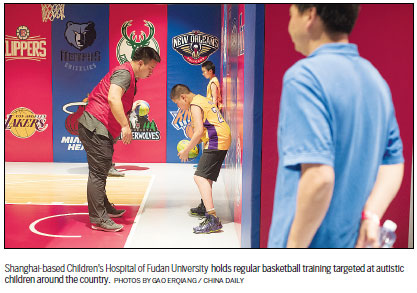Finding their inner voice

Presently, all the members of the team are boys. Wang pointed out that one of the reasons for this is because more boys suffer from autism than girls - statistics show that the ratio is 4 to 1. Also, parents are more likely to allow boys instead of girls to take part in such activities.
"There are no cases anywhere in the world where an autistic child is completely healed but measures can be taken to help alleviate the symptoms of autism. My son might be special but we want to cope with it in a positive way and help him to grow up happily," explained Chen Chu's father, Chen Ming, when asked about his motivations behind letting his son participate in the training sessions.
Chen, 41, realized that his son was different from other babies when the latter was just a year old. The boy's temperament suggested that something was amiss. But it was not till a few years later that the family started to seek professional help.
"He was a pain for anyone who was babysitting him because he was extraordinarily ill-tempered and never followed instructions. He threw anything he could get his hands on out of the window," said Chen, a sales manager at a trading corporation.
During a pre-kindergarten health check, doctors said that the then 3-year-old was likely to be suffering from autism. However, consultations with experts at different medical institutions all yielded different diagnosis. Some just said that the boy's mental development was slower than usual.
"Till today, I don't believe any diagnosis about my son's mental condition. However, I had no choice but to declare him as autistic because we needed medical proof to enrol him in a school that caters to children with conditions such as cerebral palsy, Down's Syndrome and autism," Chen said.
He added that what his son learns at school is very limited as the needs of every child is different. As such, learning through repetition is the main form of education. To make learning more interesting, Chen spends most of his time accompanying his son to do activities the latter enjoys. Besides basketball, the child also enjoys swimming.
"Although his communication ability is limited and he seldom expresses how he feels, we can tell from his reaction that he really enjoys the time in the pool," Chen said.
Swimming is also the favorite sport for Huang Hui's 11-year-old boy who has autism. He started swimming at the age of 5 and is adept in the breaststroke and freestyle.
Huang, who is a surgeon, said the family often plays sports with the child during the weekends. They also make it a point to take him traveling frequently.
"All parents experience pains in the upbringing of their children. What makes it different is that our child makes progress more slowly. The most important element in the process is the attitude of the parents. Things will become easier if we don't take it for granted that children must learn everything they are taught perfectly well," he said.
Non-sporting therapy
Wu Wei, the father of a 10-year-old autistic boy, said that there are many autism treatment methods that claim to be the best. For him, he chose the Relationship Development Intervention (RDI) method after personally witnessing its effectiveness.
The concept of RDI revolves around allowing autistic children to understand the elements of interpersonal communication. This method does not view autism as a disease that needs to be cured. Instead, practitioners focus on helping an autistic child achieve his or her full potential.
RDI was created by a couple in the United States who are both psychologists.
Seven years ago, when Wu was attending a lecture on RDI, he noticed a 7-year-old autistic boy in the audience who was accompanied by his parents. Like most other autistic children, he was not able to sit quietly and pay attention during the one-hour lecture.
After witnessing how the boy's condition had dramatically improved during the next lecture four months later - it was due to the RDI sessions he underwent two to three times a week - Wu was convinced to enrol his own son in the therapy program. In Shanghai, RDI consultants conduct tailored treatment sessions in the comfort of the child's home.
Chen's son started undergoing the program when he was 5 years old. After two years in the program, he could follow the teacher's actions and dance with other children.
"He now attends a mainstream school and can follow the schedule of the school and take care of himself in most cases," said Wu.
Inspired by his son's progress, Wu yearned to help other parents with autistic children learn about the RDI method. He resigned from his position at a scientific research institute five years ago in order to become a professional consultant for RDI. He now works at Shanghai Counseling Playground Ltd.
"For example, we need to make autistic children understand that facial expressions and gestures are important in interpersonal communication, sometimes even more important than what people say. So they must look at others when they talk," explained Wu of what the RDI program involves.
"What makes me the happiest is when a child knows how to make eye contact. They usually look at the floor when they talk," he said.
According to Wu, there are only five such consultants like himself on the Chinese mainland. Three of them are parents whose children have autism.
For Chen, it was not behavioral therapy but probiotics from a doctor in the United States that helped his son's condition improve.
"The doctor told me that the problem actually stems from low immune function. I just believed his idea. I don't know why," said Chen.
He added that his son's condition had dramatically improved after just months of taking the probiotics - the child would not longer display aggressive behavior whenever he could not be understood.
However, two years ago, the child stopped making progress.
"Still we will look at the bright side of things. We tried and will try other approaches that might help him," he added.
zhouwenting@chinadaily.com.cn
















